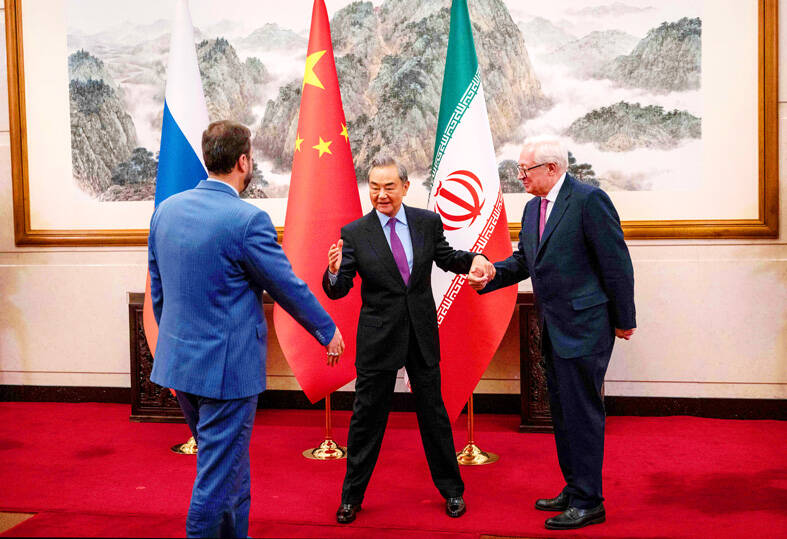China and Russia yesterday joined Iran in denouncing US sanctions, and backed efforts to restore a landmark nuclear deal with Tehran that US President Donald Trump abandoned in his first term and now wants to replace.
The three countries — all sanctioned by the US to varying degrees — stressed the need to end unilateral restrictions and urged the resumption of international talks over Iran’s atomic activities at a meeting in Beijing, a joint statement said.
Russia and China were key participants in the agreement signed during former US president Barack Obama’s administration that restricted Iran’s nuclear activity in exchange for sanctions relief, before Trump’s withdrawal in 2018.

Photo: AFP
As the standoff drags on, Iran has expanded its stocks of near-bomb grade enriched uranium, while Washington has toughened its sanctions.
Chinese Vice Minister of Foreign Affairs Ma Zhaoxu (馬朝旭) hosted yesterday’s meeting, which was also attended by Russian Deputy Minister of Foreign Affairs Sergei Ryabkov and his Iranian counterpart, Kazem Gharibabadi.
A separate meeting included Chinese Minister of Foreign Affairs Wang Yi (王毅).
“Political and diplomatic engagement and dialogue based on the principle of mutual respect remains the only viable and practical option,” Ma told reporters after the meeting.
Last week, Trump reiterated his interest in striking a new nuclear deal with Iran and warned the only alternative for the Islamic republic was to face military action.
The Beijing gathering follows a flurry of diplomatic activity on Iran’s nuclear program as world powers try to evade another crisis, at a time when wars in the Middle East and Ukraine are posing risks to energy prices and the global economy.
Iran has already had at least two rounds of preliminary nuclear talks with diplomats from the UK, France and Germany in Geneva in recent months. Trump also wrote a letter addressed to the Iranian leadership, which was received in Tehran on Wednesday via a top official from the United Arab Emirates.
The contents of the missive are not known and there has been no official response.
The participants in Beijing emphasized the need for all countries to abstain from actions that would undermine the inspection activities of the International Atomic Energy Agency monitors still working in Iran. The UN watchdog last month reported a surge in nuclear activity in Iran over the past few months.
“The situation has reached a critical juncture again. We must buy time for peace, resolve disputes through political and diplomatic means, and oppose the use of force and illegal sanctions,” Wang told reporters.

INVESTIGATION: The case is the latest instance of a DPP figure being implicated in an espionage network accused of allegedly leaking information to Chinese intelligence Democratic Progressive Party (DPP) member Ho Jen-chieh (何仁傑) was detained and held incommunicado yesterday on suspicion of spying for China during his tenure as assistant to then-minister of foreign affairs Joseph Wu (吳釗燮). The Taipei District Prosecutors’ Office said Ho was implicated during its investigation into alleged spying activities by former Presidential Office consultant Wu Shang-yu (吳尚雨). Prosecutors said there is reason to believe Ho breached the National Security Act (國家安全法) by leaking classified Ministry of Foreign Affairs information to Chinese intelligence. Following interrogation, prosecutors petitioned the Taipei District Court to detain Ho, citing concerns over potential collusion or tampering of evidence. The

Seventy percent of middle and elementary schools now conduct English classes entirely in English, the Ministry of Education said, as it encourages schools nationwide to adopt this practice Minister of Education (MOE) Cheng Ying-yao (鄭英耀) is scheduled to present a report on the government’s bilingual education policy to the Legislative Yuan’s Education and Culture Committee today. The report would outline strategies aimed at expanding access to education, reducing regional disparities and improving talent cultivation. Implementation of bilingual education policies has varied across local governments, occasionally drawing public criticism. For example, some schools have required teachers of non-English subjects to pass English proficiency

NEGOTIATIONS: The US response to the countermeasures and plans Taiwan presented has been positive, including boosting procurement and investment, the president said Taiwan is included in the first group for trade negotiations with the US, President William Lai (賴清德) said yesterday, as he seeks to shield Taiwanese exporters from a 32 percent tariff. In Washington, US Trade Representative Jamieson Greer said in an interview on Fox News on Thursday that he would speak to his Taiwanese and Israeli counterparts yesterday about tariffs after holding a long discussion with the Vietnamese earlier. US President Donald Trump on Wednesday postponed punishing levies on multiple trade partners, including Taiwan, for three months after trillions of US dollars were wiped off global markets. He has maintained a 10 percent

TRADE: The premier pledged safeguards on ‘Made in Taiwan’ labeling, anti-dumping measures and stricter export controls to strengthen its position in trade talks Products labeled “made in Taiwan” must be genuinely made in Taiwan, Premier Cho Jung-tai (卓榮泰) said yesterday, vowing to enforce strict safeguards against “origin laundering” and initiate anti-dumping investigations to prevent China dumping its products in Taiwan. Cho made the remarks in a discussion session with representatives from industries in Kaohsiung. In response to the US government’s recent announcement of “reciprocal” tariffs on its trading partners, President William Lai (賴清德) and Cho last week began a series of consultations with industry leaders nationwide to gather feedback and address concerns. Taiwanese and US officials held a videoconference on Friday evening to discuss the